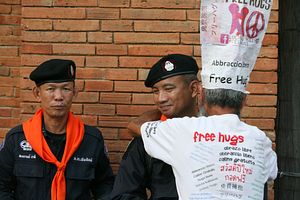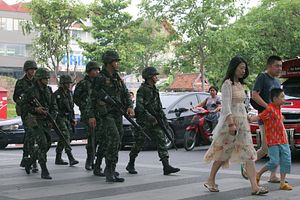On May 22, 2014, the Thai army seized power in a coup that unseated the democratically elected government. Since then there have been sporadic protests against the coup, mostly by flash mobs that appear and then break up when soldiers arrive.
The military has detained or summoned hundreds of politicians, academics, activists and journalists from both sides of the political spectrum. Most were released after seven days detention but the junta has repeatedly warned against any form of criticism of its rule, even posting rewards of 500 baht ($15) on pictures of persons showing dissent to the coup.
To date, the opposition Red Shirts have stayed quiet. Some leaders even announced that they would cease political activities and cooperate with the army.
At the same time the Junta is trying its best to win the hearts and minds of the people by hosting ‘’return happiness to the people’’ concerts with free food and live music.
On the streets the few remaining tourists are eager to have their photo taken with heavily geared soldiers stationed on major roads and public places.
A look into daily life under the junta.











































